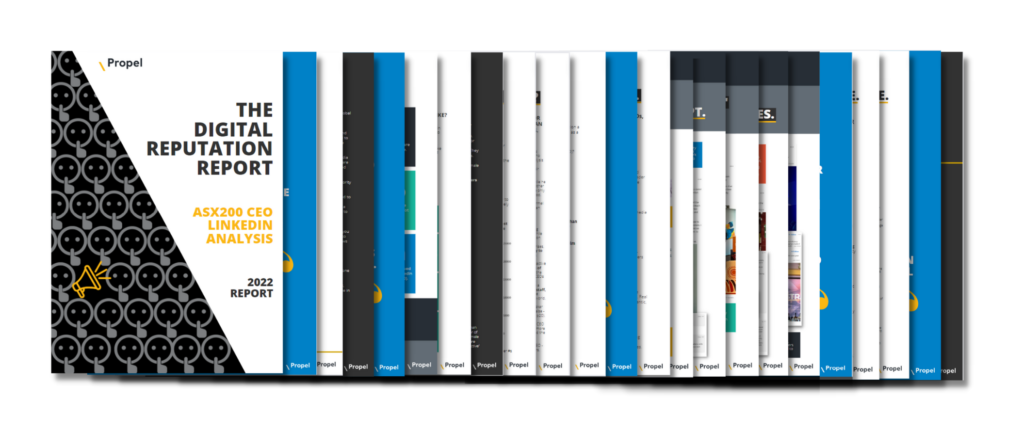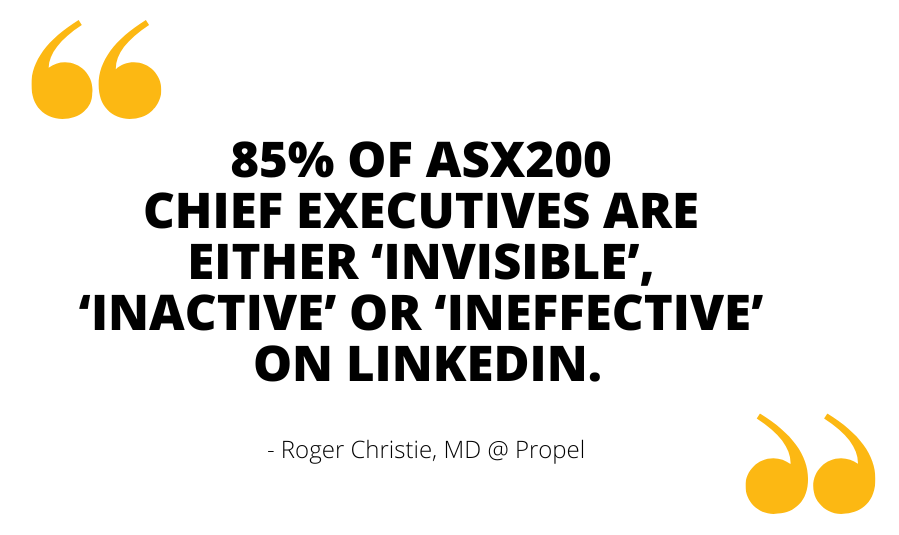‘The Digital Reputation Report – ASX200 CEO LinkedIn Analysis’ reveals ‘online anonymity’ to be the preferred strategy for the vast majority of Australia’s ASX200 CEOs. Six percent of CEOs are ‘very active’ and setting the social media benchmark. Who are they?
Download your copy of the report to find out who are our leading ASX200 CEOs online alongside statistics, trends and analysis to help your leader on their own digital reputation journey.
DOWNLOAD YOUR COPY OF ‘THE DIGITAL REPUTATION REPORT’ TODAY


Not long ago, the CEO of one of Australia’s largest organisations remained silent while the digital masses conducted a swift and far-reaching character assassination that would ultimately do immense reputational damage, both individually and corporately.
Was the attack warranted?
In my opinion, no.
Were the allegations accurate? History would suggest not.
So, why would this CEO – any CEO – stay silent, leaving others to ‘fill the void’ and take control of their corporate future?
This is the question that remains unanswered if you analyse the digital footprints of those leading our 200 largest listed organisations.
In Propel’s most recent study – The Digital Reputation Report – almost 85% of ASX200 chief executives are either ‘invisible’, ‘inactive’ or ‘ineffective’ on LinkedIn. “The silent majority” is the best way to describe them.
After three years of incredible instability and fear, the time for leaders to lead is now. As one LinkedIn user said, praising a post by former Telstra CEO Andy Penn:
“I understand the anxiety of high profile Australian business leaders to make public statements … but this is absolutely NOT the time to be shy. The community and your shareholders want to hear from you.”
What’s holding our leaders back? There is an almost universal need to attract, reconnect, and reassure across Australia right now.
And the most powerful way for leaders to talk directly to key audiences in their own words is: social media.
Staff, candidates, partners, customers, investors, media – all want to hear from leaders. Edelman, Brunswick and other global studies tell us so.
Social media is a unique and immense opportunity for leaders to get personal and purposeful, to build intimacy at scale, and to show what they stand for – far beyond the bottom line.
But, make no mistake – leaders’ social media actions today have a direct impact on where people invest tomorrow (their hard-earned cash and their careers).
Given the evidence, I’m surprised the majority remain silent.
Legacy attitudes around social media need to shift: avoiding social media today creates more risk – your best chance to de-risk in a world where stakeholders expect leaders to turn up online is to participate.
This report serves as an unofficial ‘call to arms’ to every communications advisor – you are the trusted counsel others will come to for guidance in this space. If the data shows that participation is more powerful than avoidance, what is your plan for leaders?
DOWNLOAD YOUR COPY OF ‘THE DIGITAL REPUTATION REPORT’ TODAY
